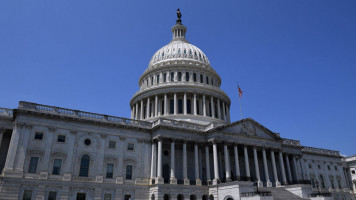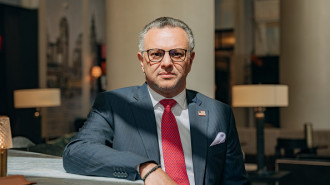Sudan military, protesters due to finalise new transitional council after progress marred by violence
The institution of a civilian-led transitional government has been among the thorniest issues in weeks-long negotiations between the protest organiser-led Alliance for Freedom and Change (AFC) and the military junta that took power last month.
Mohammad Eisa Koko, a 17-year-old protester, died on Wednesday after suffering a direct bullet wound to the back two days ago, when an unidentified armed group attacked demonstrators in the capital Khartoum, the Central Committee for Sudanese Doctors (CCSD) said on Wednesday.
Violence against protesters, often purportedly perpetrated by paramilitary groups and militias linked to ousted President Omar al-Bashir's regime, has repeatedly halted negotiations.
Attempts by the military and paramilitary Rapid Support Forces (RSF), led by the transitional military council's deputy leader, to remove barricades surrounding a mass sit-in in Khartoum have also slowed talks.
After it was announced on Monday that the two sides had finally agreed to form a long-debated joint transitional council, the military and AFC said on Tuesday night they had agreed to a civilian legislative body.
The body, which will tackle day-to-day issues, will consist of 300 members, 67 percent of whom will be drawn from the AFC and the rest from other political groups.
They also agreed to extend the transitional period from two to three years.
Twitter Post
|
The first six months of the transition will reportedly be devoted to reaching peace accords with rebels in conflict zones including Darfur, Blue Nile and South Kordofan.
What is yet to be agreed upon is the composition of the sovereign transitional council, one of the most controversial issues faced by negotiators.
While the military generals currently leading the country desire a military-dominated body, protesters insist upon a majority-civilian council.
The council will take all key decisions concerning national issues over the next three years.
Wednesday's crucial negotiations will start at 9 pm on Wednesday evening, said Khalid Omar Yousef, an AFC representative.
He told AFP that the two sides expect to announce the result of the negotiations at midnight.
"We vow to our people that the agreement will be completed fully within 24 hours in a way that it meets the people's aspirations," General Yasser al-Atta, a military council member, told reporters on Wednesday.
Yousef downplayed the role of the proposed joint transitional council, insisting the country's civilian transitional government would have a powerful cabinet in charge of decision making.
"All powers will be in the cabinet's hand, which will be formed by the Alliance for Freedom and Change," he said.
"Only the ministers of defence and interior are going to be with the military."
Violences marrs agreements
Six people, one of them a soldier, were killed late on Monday, with more than 200 wounded.
Eyewitnesses said armed men dressed in RSF fatigues had shot at and attacked protesters, a day after demonstrators had set up roadblocks, deemed "unacceptable" by the military, on a major thoroughfare in the capital.
The military council denied those claims, saying "infiltrators" had attacked in an attempt to stymie negotiations, while an anonymous RSF source told Channel 4 reporter Yousra Elbagir that a rogue faction within the group unhappy with the civilian-military agreement had retaliated.
"We put the whole responsibility on the military council for what happened yesterday because it's their direct responsibility to guard and protect the citizens," Mohamed Naji al-Assam, a prominent AFC representative, told reporters on Tuesday.
Three as-yet-unidentified bodies were also found in the Nile following the violence on Monday night, according to the CCSD.
Follow us on Twitter: @The_NewArab

![Palestinians mourned the victims of an Israeli strike on Deir al-Balah [Getty]](/sites/default/files/styles/image_684x385/public/2024-11/GettyImages-2182362043.jpg?h=199d8c1f&itok=xSHZFbmc)


![The law could be enforced against teachers without prior notice [Getty]](/sites/default/files/styles/image_684x385/public/2178740715.jpeg?h=a5f2f23a&itok=hnqrCS4x)
 Follow the Middle East's top stories in English at The New Arab on Google News
Follow the Middle East's top stories in English at The New Arab on Google News


